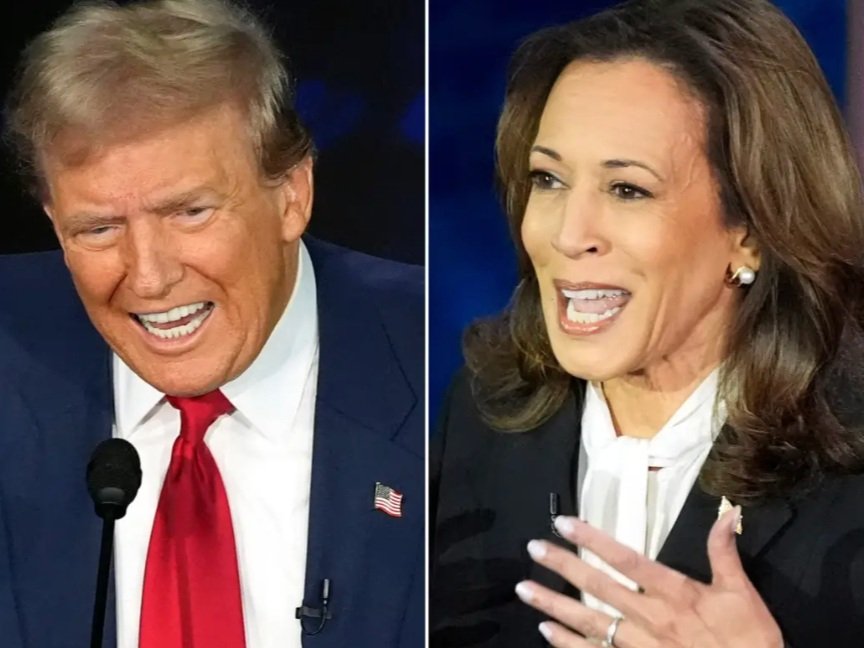What Kind of Debates Do We Really Need?
By Gabi Mott ‘25
Over the last decade, politicians have evidently changed the way they conduct themselves. Trump is an easy scapegoat for this shift, and a largely valid one. He’s always presented himself as an unorthodox candidate, with a brasher, cruder demeanor than his opponents, and these traits were what drew many of his supporters to him even as his behavior invited endless controversy. Since the 2016 election, his time in politics has increasingly normalized personal attacks between politicians . While the Democratic Party has historically tried to maintain a comparatively diplomatic image, the 2024 Trump-Harris debate has perhaps officially marked the end of the “When they go low, we go high” era.
On a personal level, I have no issue with Harris throwing Trump’s words in his face. As she intentionally provoked him, inciting rants on crowd sizes and migrants, it was frankly satisfying to see his insults returned with equal fire.
However, Harris’ embrace of this more confrontational brand of politics reflects a change in how the American public perceives debate as a medium.
These increasingly fiery debates are a symptom of growing political polarization. Indeed, a common criticism of the Democratic party is that they’re running a platform based on their voters’ dislike of Trump, rather than the strength of their own policies. While hatred of a candidate is a valid reason to vote for the opposing side, it is not necessarily a sustainable one. Joe Biden’s declining approval ratings and Hillary Clinton’s failed 2016 campaign are notable examples of the end results of this strategy. Riding the tail ends of her initial surge of popularity, Harris needs to distinguish herself on more levels than being the anti-Trump if her campaign and possible presidency are to be successful.
The modern problems with debate go far beyond the presidential race. It is largely understood that the presidential debate is simply a forum for the candidates to present their ideas and rebut the other side, not a moment of genuine, reflective conversation. This distinction is why I find it hard to condemn Harris’ attacks towards Trump or even argue the importance of bipartisanship. Finding compromise only works if both sides are willing to do so, and that will rarely be the case in a televised debate.
This lack of willingness to listen is exactly the problem. The presidential debates are good for two things only: as a direct statement of the candidates’ positions, and as entertainment. Even the first point is arguable, since most voters have likely already decided their opinions on the candidates. However, throughout the media, debates are held up not just as entertainment, not just as a display of two arguments, but as a definitive way to decide which viewpoint is correct.
Throughout the last decade, figures like Ben Shapiro and Charlie Kirk have made a living debating with others in the “free marketplace of ideas.” To be clear, this is not solely a right-wing phenomenon. The youtube channel Jubilee’s recent video, “Can 1 Woke Teen Survive 20 Trump Supporters?”, accumulated 4.4 million views within two days. No matter how much I agree or disagree with the opinions expressed in these videos, and even if all participants were acting in good faith, these debates are not ultimately about ideas— they’re about rhetoric. The more charismatic speaker will always be the de facto winner.
Debate is not necessarily harmful. Even if all parties come away with their minds thoroughly unchanged, the expression of ideas and the honing of rhetoric is itself a worthy task. Nor should placid bipartisanship be the end-goal of politics. However, as society moves further towards short-form content— whether that’s Instagram reels, clips on Tiktok, or rapid-fire Youtube debates—, we risk reducing our political understanding to snappy lines and quotable moments.
The necessary antidote is a return to real conversation. Not debate, no matter how civil, nor even Harkness table discussions (wonderful as they may be), but boring, earnest, one-on-one conversation. And not just conversations— after all, we all have them every day— but reading long news articles and listening to lectures. The exact medium doesn’t matter; any environment where nuance can thrive will do. Ultimately, debate must be understood as a supplement to true discussion—nothing more and nothing less.
